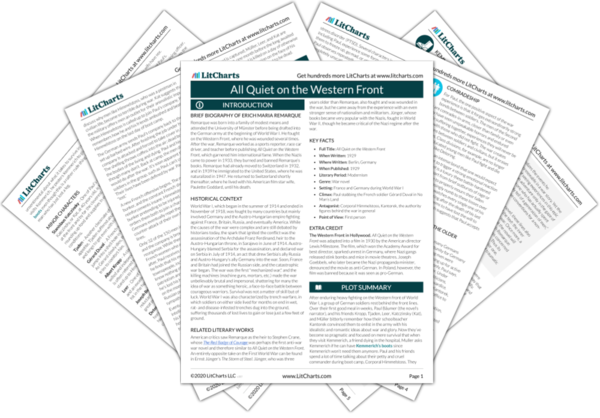Brief Biography of Erich Maria Remarque
Remarque was born into a family of modest means and attended the University of Münster before being drafted into the German army at the beginning of World War I. He fought on the Western Front, where he was wounded several times. After the war, Remarque worked as a sports reporter, race car driver, and teacher before publishing All Quiet on the Western Front, which garnered him international fame. When the Nazis came to power in 1933, they burned and banned Remarque’s books. Remarque had already moved to Switzerland in 1932, and in 1939 he immigrated to the United States, where he was naturalized in 1947. He returned to Switzerland shortly thereafter, where he lived with his American film star wife, Paulette Goddard, until his death.
Historical Context of All Quiet on the Western Front
World War I, which began in the summer of 1914 and ended in November of 1918, was fought by many countries but mainly involved Germany and the Austro-Hungarian empire fighting against France, Britain, Russia, and eventually America. While the causes of the war were complex and are still debated by historians today, the spark that ignited the conflict was the assassination of the Archduke Franz Ferdinand, heir to the Austro-Hungarian throne, in Sarajevo in June of 1914. Austro-Hungary blamed Serbia for the assassination, and declared war on Serbia in July of 1914, an act that drew Serbia’s ally Russia and Austro-Hungary’s ally Germany into the war. Soon, France and Britain had joined the Russian side, and the catastrophic war began. The war was the first "mechanized war," and the killing machines (machine guns, mortars, etc.) made the war unbelievably brutal and impersonal, shattering for many the idea of war as something heroic, a face-to-face battle between courageous warriors. Survival was not a matter of skill but of luck. World War I was also characterized by trench warfare, in which soldiers on either side lived for months on end in wet, rat- and disease-infested trenches dug into the ground, suffering thousands of lost lives to gain or lose just a few feet of ground.
Other Books Related to All Quiet on the Western Front
American critics saw Remarque as the heir to Stephen Crane, whose
The Red Badge of Courage was perhaps the first anti-war war novel and therefore similar to
All Quiet on the Western Front. An entirely opposite take on the First World War can be found in Ernst Jünger’s
The Storm of Steel. Jünger, who was three years older than Remarque, also fought and was wounded in the war, but he came away from the experience with an even stronger sense of nationalism and militarism. Jünger, whose books became very popular with the Nazis, fought in World War II, though he became critical of the Nazi regime after the war.
Key Facts about All Quiet on the Western Front
-
Full Title: All Quiet on the Western Front
-
When Written: 1929
-
Where Written: Berlin, Germany
-
When Published: 1929
-
Literary Period: Modernism
-
Genre: War novel
-
Setting: France and Germany during World War I
-
Climax: Paul stabbing the French soldier Gérard Duval in No Man’s Land
-
Antagonist: Corporal Himmelstoss, Kantorek, the authority figures behind the war in general
-
Point of View: First person
Extra Credit for All Quiet on the Western Front
